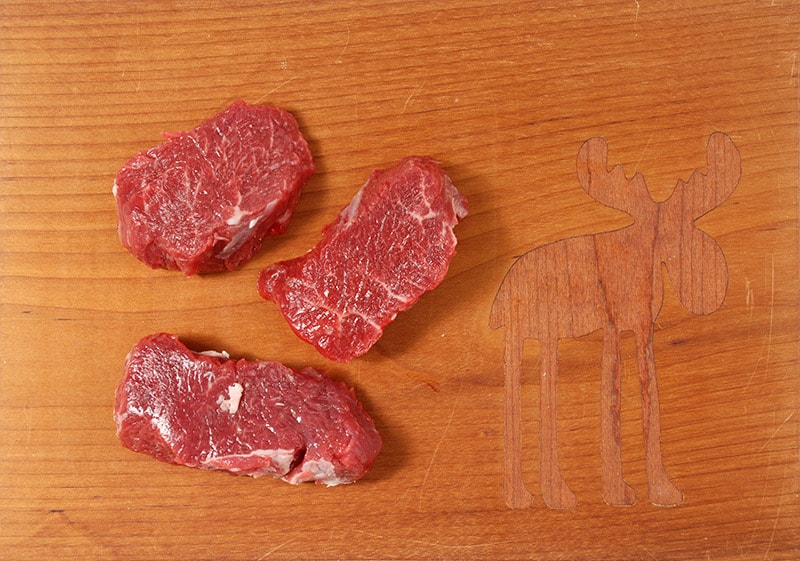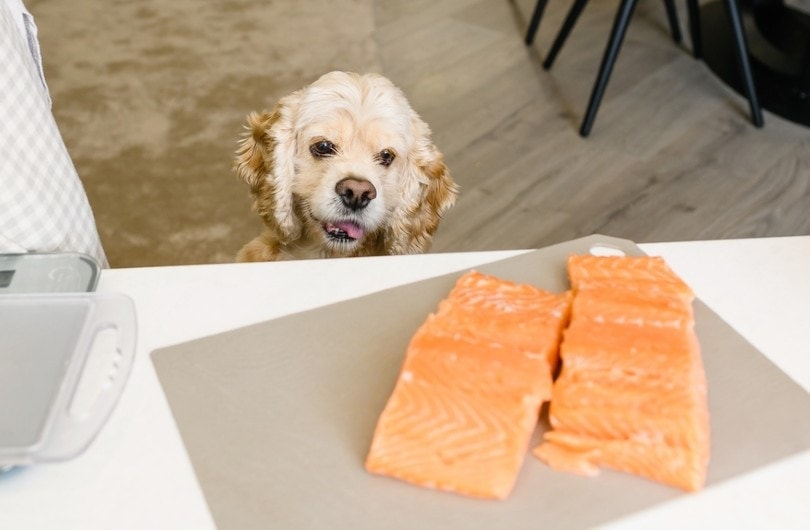Can Dogs Eat Elk Meat? Vet Reviewed Health Concerns & FAQ

Updated on

Click to Skip Ahead
While it may not be the most common item in your pantry, elk meat is indeed safe for dogs to eat. As a lean protein source, it can offer a tasty and nutritious alternative to more traditional meats like chicken or beef. However, as with any food, it’s essential to serve it in moderation and ensure proper preparation to avoid potential health risks. Let’s dive deeper into understanding the ins and outs of feeding your dog elk meat.
The Nutritional Value of Elk Meat for Dogs
Dogs are technically omnivores, not carnivores like many people believe. That being said, a dog’s diet should still be high in protein, and the best way to get protein is from meat, including elk meat. Dogs can get all of their nutritional needs from commercial dog food. But if you want to give your dog a treat of elk meat, here are some of the benefits of elk meat for dogs.
High Protein Content
Elk meat stands out for its high protein content, which is vital for dogs. Protein supports various bodily functions, including muscle growth and repair, immune system function, and skin and coat health.
Low Fat
Compared to other red meats, elk is relatively low in fat. This makes it a good choice for dogs, especially those that are overweight or have health conditions that require a low-fat diet.
Rich in Vitamins and Minerals
Elk meat is packed with essential vitamins and minerals. It’s an excellent source of iron, which aids in oxygen transportation in the blood. It also contains zinc, which supports immune function and skin health, and B vitamins that aid in energy production and brain function.

Preparing Elk Meat for Dogs
If you’re going to feed elk meat to your dog, it’s important that it is prepared correctly. Here’s how to prepare elk meat for your dog.
Cooking Method
While dogs can technically eat raw meat, it’s generally safer to cook it to kill any potential bacteria or parasites. When cooking elk meat for your dog, opt for methods that don’t require added fats or oils, such as boiling or grilling.
Avoid Seasonings
Dogs don’t need their food seasoned, and many seasonings can be harmful to them. Avoid adding salt, garlic, onions, or any other seasonings to the elk meat.
Portion Size
Even though elk meat is healthy, it should still be served in moderation as part of a balanced diet.

Potential Concerns of Elk Meat for Dogs
Feeding your dog elk meat can offer numerous benefits, but it’s crucial to be aware of potential health concerns. Here are a few risks you should consider.
Allergic Reactions
While uncommon, some dogs may develop an allergy or intolerance to elk meat. Canine food allergies can manifest in various ways, but the most common signs include itching, redness, and swelling, particularly around the face, ears, and paws. Other signs may include gastrointestinal issues such as vomiting and diarrhea.
If you notice these signs after feeding your dog elk meat, it’s best to consult with your vet. They can investigate whether your dog’s signs are indeed due to an allergy or intolerance to elk meat, and advise on suitable dietary adjustments.
Choking Hazard
Elk meat and bones can pose a choking hazard, especially for smaller dogs or those that tend to gulp their food without chewing properly. Make sure to cut the meat into bite-sized pieces before giving it to your dog.
It’s best to avoid feeding bones to your dog. Bones can also splinter when chewed, potentially causing injury to your dog’s mouth, throat, or digestive tract. If swallowed, chunks of bone can also cause serious intestinal obstructions. Always supervise your dog during mealtime to intervene if necessary.
Overfeeding
Elk meat is a lean source of protein, but like any food, it can contribute to weight gain if overfed. Obesity in dogs can lead to serious health problems, including diabetes, heart disease, and arthritis, among others.
To prevent overfeeding, use elk meat as part of a balanced diet. All treats, including elk meat, should account for no more than 10% of your dog’s daily calorie intake. Be mindful of portion sizes in general and adjust them based on your dog’s size, age, and activity level. Regular exercise is also vital to help your dog maintain a healthy weight.
Remember, each dog is unique, and what works for one may not work for another. Always consult with your vet before making significant changes to your dog’s diet.
Alternatives to Elk Meat
While elk meat can be a nutritious addition to your dog’s diet, it may not always be readily available. Fortunately, there are several alternatives that can provide similar benefits. Here are a few options to consider.
Other Lean Meats
If you’re having trouble sourcing elk meat, other lean meats can serve as excellent substitutes.
Chicken is a commonly used protein source in many commercial dog foods due to its high protein content and digestibility. It’s also rich in essential amino acids and vitamins like B6 and B12, which support brain health and function.
Turkey is another good option, offering a slightly richer taste than chicken. It’s low in fat and provides essential nutrients like iron, zinc, and potassium.
Rabbit meat is less common but can be a great choice for dogs with allergies to more typical protein sources. It’s lean meat with a high protein content and a good source of vitamins B3 and B12, phosphorus, and selenium.
Fish

Fish, particularly oily varieties like salmon, can be a fantastic alternative to elk meat. They’re packed with high-quality protein and abundant in omega-3 fatty acids, known for their inflammation-reducing properties and ability to support skin and coat health.
Salmon is also a great source of vitamin D, which aids in bone health, and vitamin B12, necessary for nerve function. Tuna, while high in protein and vitamins, should be given in moderation due to its higher mercury content.
Remember to cook the fish thoroughly and remove any bones before serving it to your dog.
Plant-Based Proteins
For dogs with meat allergies or those on a vegetarian diet, plant-based proteins can provide some essential nutrients.
Lentils are a great protein source and also provide dietary fiber, which aids digestion, and iron, crucial for producing red blood cells. Chickpeas, also known as garbanzo beans, are another excellent plant-based protein source. They’re packed with fiber and nutrients like potassium and vitamin C.
When serving these to your dog, make sure they’re cooked and mashed or pureed to aid digestion. Also, remember that while plant-based proteins can supplement a dog’s diet, they shouldn’t replace animal proteins entirely unless under the guidance of a veterinarian due to dogs’ carnivorous needs.
Conclusion
Feeding your dog elk meat can be a great way to provide them with lean protein and essential nutrients. However, it’s crucial to ensure proper preparation and portion control to keep your furry friend safe and healthy. Remember, individual dogs will have different dietary requirements, so be sure to consult with your vet before adding new foods such as elk meat to your pet’s diet. Here’s to a lifetime of tail wags and healthy meals!
Featured Image Credit: ason, Shutterstock













